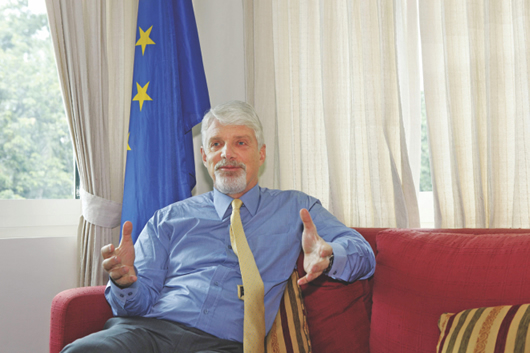
William Hanna – Head of EU in Ghana
Mr William Hanna, the European Union (EU) Ambassador, has reaffirmed the Union’s commitment to support the country’s decentralisation agenda, to spur development especially at the local level.
Mr Hanna said the EU in 2016 gave Ghana 11.9 million Euros towards the implementation of the National Decentralisation Action Plan 2015-2019.
He explained that the money was given to the country following the good results of decentralisation process monitored in the past 12 months.
The indicators were measures taken in favour of better dedicated staff at the District level, and strengthening local level capacity to participate in planning and budgeting.
Other indicators were timely disbursement of funds from the District Assemblies Common Fund to the Metropolitan, Municipal and District Assemblies and the improvement of the functioning of the feeder roads system.
He made this known when he led a three-member delegation of the Union to call on Hajia Alima Mahama, Minister of Local Government and Rural Development in Accra.
The Ambassador noted that the Union was working with the country to ensure that more citizens got better services at the local level such as feeder roads or social protection.
The EU also aims to strengthen local authorities to play their role in better accountability, transparency and service delivery.
He said the Union placed more emphasis on agriculture, job opportunities for the youth and decentralisation because they were key pillars in enhancing economic development of any country.
Mr Hanna said the Union had supported the country to advance its democratic values in the area of successful elections and other developmental projects.
He said his outfit was working assiduously with stakeholders to provide assistance to link farmers to the market to ensure the competitiveness of their produce and avoid post-harvest losses.
Hajia Mahama thanked the delegation for the visit and the support over the years especially in the area of decentralisation, saying the Ministry will continue to pursue inclusive projects that will benefit all especially the rural communities.
“Decentralisation remains a key component of government agenda and the Ministry is determined to liaise with the district assemblies to chart the way forward in identifying pressing developmental issues confronting the local people for implementation”, she added.
She observed that the Ministry would put in place monitoring and evaluation mechanism to ensure that projects implementation at the district level was adhered to ensure transparency and accountability.
Source: GNA























